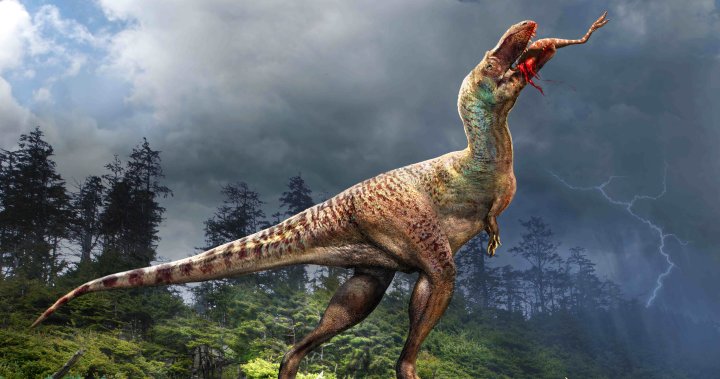Palaeontologists at the Royal Tyrrell Museum in Alberta have discovered the dining preferences of a juvenile tyrannosaur: drumsticks.
The discovery was made while a technician was cleaning up a fossil of a five- to seven-year-old Gorgosaurus libratus that was originally located in 2009.
“While he was cleaning up the fossil, he noticed those little toe bones that were coming out of the rib cage. So we had a meeting, decided to flip the specimen over to study the inside of the rib cage. And that’s where we found the leg bones of two small dinosaurs,” Dr. François Therrien, curator of dinosaur palaeontology, said.
It’s a first in the study of larger meat-eating dinosaurs. The gorgosaur specimen was estimated to be around 740 pounds (335 kilograms) when it was fossilized, around one-eighth the size of an adult. The gorgosaur was a tyrannosaur that lived 75 million years ago, several million years before the famous Tyrannosaurus rex.
“I knew right away that this was a unique and unusual discovery because the tyrannosaur skeleton with prey items preserved inside the stomach region had never been found before,” the University of Calgary’s Dr. Darla Zelenitsky said.

The discovery was published by Therrien and Zelenitsky in the journal Science Advances.
Get the latest National news.
Sent to your email, every day.
The leg bones inside the stomach of the gorgosaur were determined to be from the bird-like herbivore species Citipes elegans.
“It’s telling us that actually these small meat-eating dinosaurs, these small tyrannosaurs, were actually fond of drumsticks,” Therrien said. “They actually dissected the legs out of those little animals, swallowed the legs whole and then left the carcass out.
“It seemed to have been really a preferred hunting style and the feeding style for young tyrannosaurs.”
Therrien said the modern animal that would be closest to Citipes would be cassowaries, crested ostrich-like birds that are found in Australia and New Guinea.
13
The area of the gorgosaur stomach, in red, that paleontologists at the Royal Tyrrell Museum found citipes bones in.
handout / Royal Tyrell Museum
23
Citipes elegans leg bones from two specimens, coloured in green and blue, that were found in the fossilized stomach of a Gorgosaurus libratus at the Royal Tyrrell Museum.
handout / Royal Tyrell Museum
33
Dr. Francois Therrien (L) and Dr. Darla Zelenitsky (R) examine the Gorgosaurus libratus that had Citipes elegans bones inside its stomach.
Global News
He said the previous fossil history led researchers to believe Citipes were rare, but the remnants of the two found in the gorgosaur stomach led Therrien and his team to believe that they grew quickly and would have been abundant at the end of the Cretaceous period for the gorgosaur to readily snack on.
“This is really exciting because it gives us a lot of information about the diet and the ecology of young tyrannosaur, something that was previously unknown,” Therrien said.
“This is the first time that we had solid evidence of diet or feeding behavior in a juvenile tyrannosaur, which was really exciting,” Zelenitsky said. “People love large predatory dinosaurs. So, yeah, this is a perfect discovery for capturing the interest of people who love dinosaurs.”
Dinosaur fossils were first discovered in the province at the end of the 19th century, so much has already been discovered about what kind of giant lizards roamed Alberta. But this discovery is one of a new realm, which includes further evidence of feathers or nesting behaviour.
“We’re still make amazing discoveries like that. It may not always be new species, but sometimes it will be specimens of species that were previously known but that now preserve something totally amazing,” Therrien said. “There are still many significant discoveries to be made for years to come.”
© 2023 Global News, a division of Corus Entertainment Inc.










